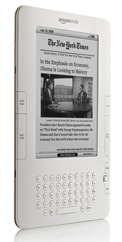
 Covered in shades of music industry deja vu, the book industry is about to plunge into the digital era. eBook hardware for the new format, most notably Amazon’s Kindle, has already begun to win over consumers and currently accounts for about 5% of sales in the U.S. book market. But now, with the imminent debut of Apple’s iPad and iBookstore platform, the space is heating to a boil. Amazon and Apple are turning up the flame as they joust for positioning and market share. Each company is attempting to enforce a competing business model designed to reinforce its competitive advantages across content providers. Both models also purport to control pricing through the use of digital rights management much like record labels did during the early days of the music industry digital transformation. Will booksellers experience the same piracy issues, file sharing and illegal downloading that has stung the music industry? Also can Amazon, which now owns 90% of the digital book market, retain its supremacy against the Apple onslaught?
Covered in shades of music industry deja vu, the book industry is about to plunge into the digital era. eBook hardware for the new format, most notably Amazon’s Kindle, has already begun to win over consumers and currently accounts for about 5% of sales in the U.S. book market. But now, with the imminent debut of Apple’s iPad and iBookstore platform, the space is heating to a boil. Amazon and Apple are turning up the flame as they joust for positioning and market share. Each company is attempting to enforce a competing business model designed to reinforce its competitive advantages across content providers. Both models also purport to control pricing through the use of digital rights management much like record labels did during the early days of the music industry digital transformation. Will booksellers experience the same piracy issues, file sharing and illegal downloading that has stung the music industry? Also can Amazon, which now owns 90% of the digital book market, retain its supremacy against the Apple onslaught?
 Apple’s plan is being likened to an agency model, where the book publisher can decide the price (average costs from $12.99-$14.99) and then get a 30% commission. Amazon wants a wholesale model to leverage its large scale via lower prices. Both companies want content providers to agree to use the same model for everyone. Apple scored a strong first takedown against Amazon when it announced it had reached agreements with four of the five largest publishers—Macmillan, Simon & Schuster, Hachette, HarperCollins and Penguin. The big publishers are unhappy with Amazon’s low prices, fearing it could ultimately shrink profits. Amazon tried removing the “buy” buttons from all Macmillan books to bully the publisher, but consumer complaints forced the retailer to relent. Now both Apple and Amazon are actively courting the smaller publishers and reports of threats are cropping up from multiple sources.
Apple’s plan is being likened to an agency model, where the book publisher can decide the price (average costs from $12.99-$14.99) and then get a 30% commission. Amazon wants a wholesale model to leverage its large scale via lower prices. Both companies want content providers to agree to use the same model for everyone. Apple scored a strong first takedown against Amazon when it announced it had reached agreements with four of the five largest publishers—Macmillan, Simon & Schuster, Hachette, HarperCollins and Penguin. The big publishers are unhappy with Amazon’s low prices, fearing it could ultimately shrink profits. Amazon tried removing the “buy” buttons from all Macmillan books to bully the publisher, but consumer complaints forced the retailer to relent. Now both Apple and Amazon are actively courting the smaller publishers and reports of threats are cropping up from multiple sources.
Amazon’s latest move has been to make its book content readable on devices in addition to the kindle. Just this week they released software that makes Kindle books readable on Mac computers. Other hardware that already had software to read Kindle books inclues the iPhone, Blackberry and many PCs.
To date, research shows baby boomers and middle aged women appear to be the most fervent adopters of the new digital book reading formats. Additional players in the digital book space include Sony, Barnes & Noble, Plastic Logic, Microsoft and Google. Apple’s iBookstore platform has the advantage of being part of its iTunes store which consumers understand and enjoy using. However, the iPad’s book-reading experience is still an unknown, leaving the book market balance of power a mystery novel yet to be written.

Category: Publishing, Sales/Marketing
About the Author
David M. Ross has been covering Nashville's music industry for over 25 years. dross@musicrow.comView Author Profile


